2013年高考语法复习——反意疑问句
图片预览

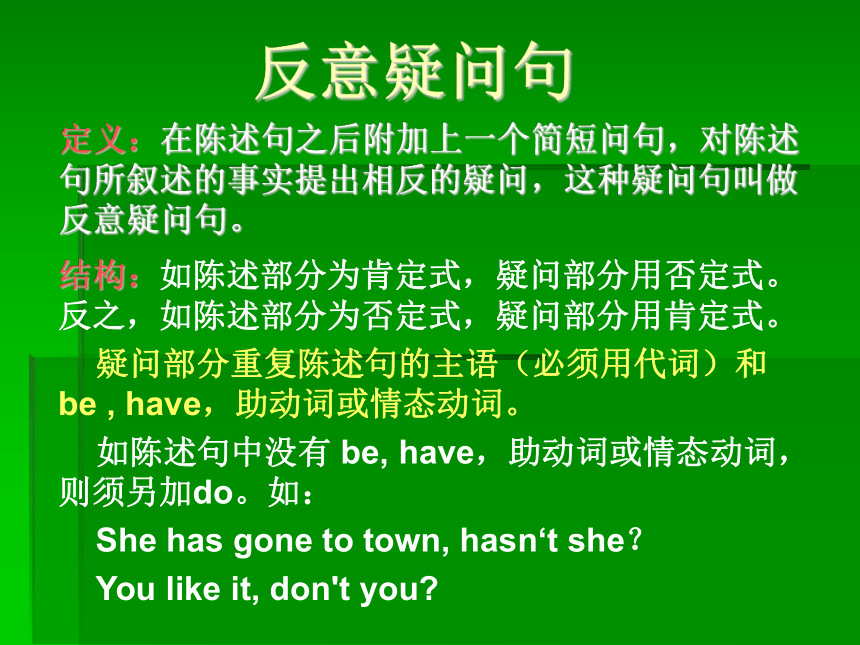
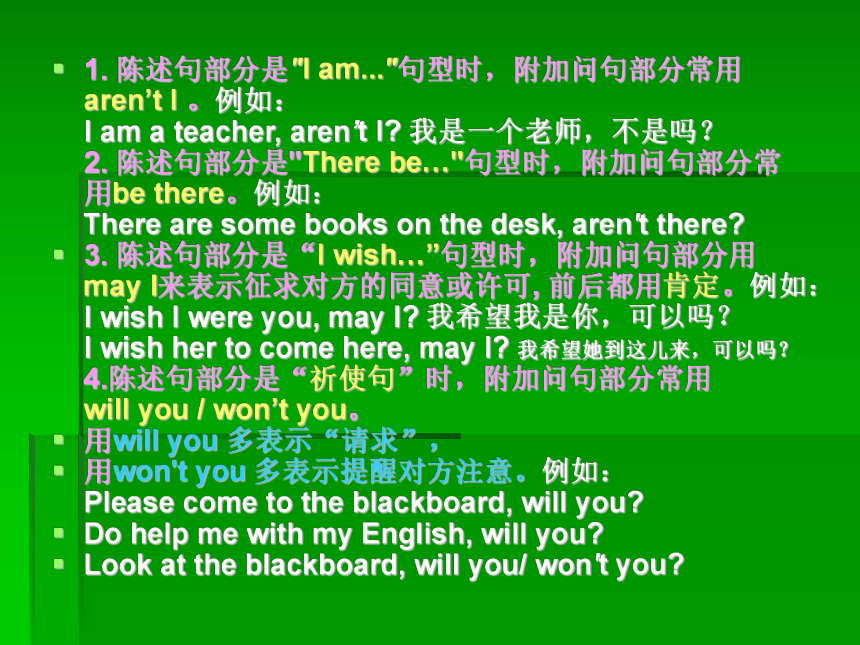
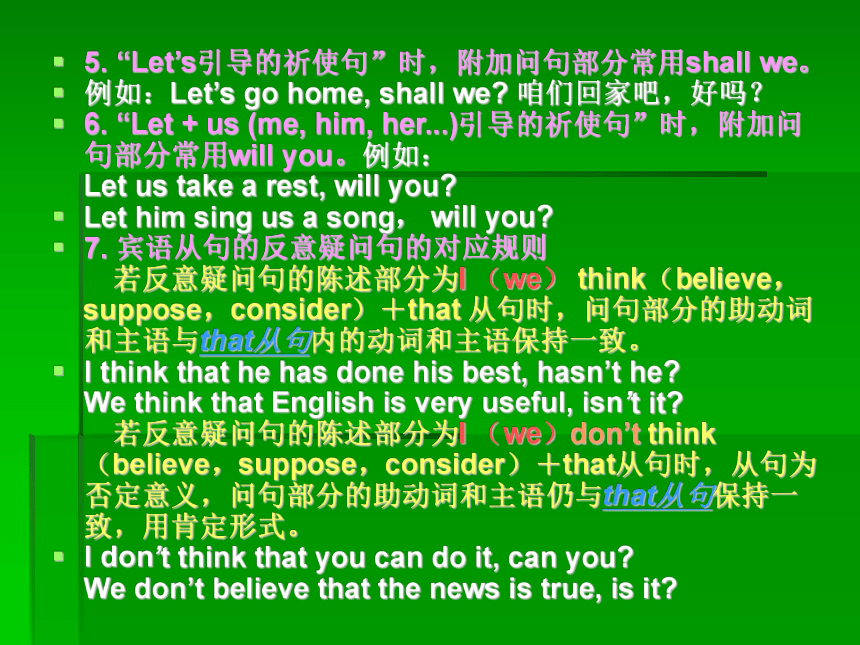
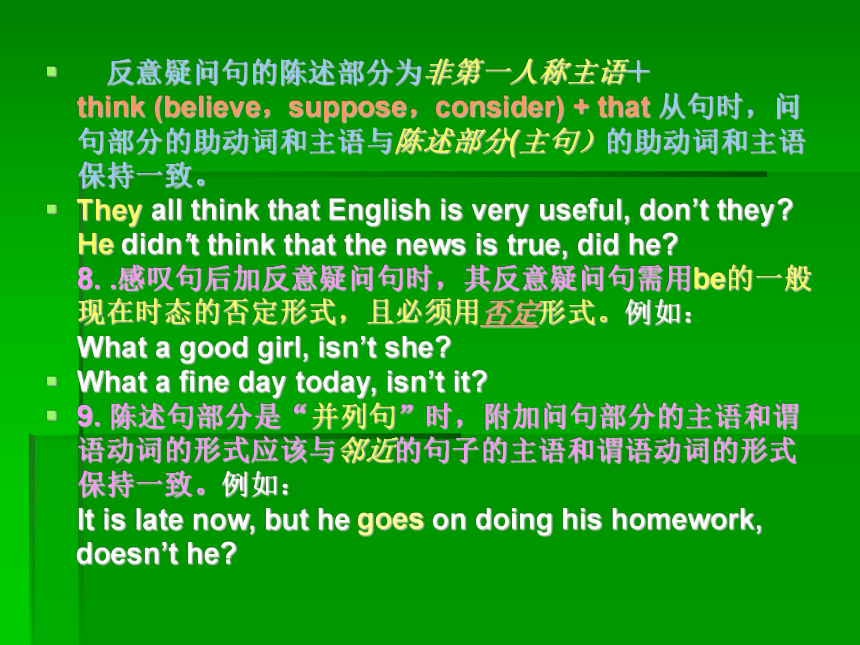
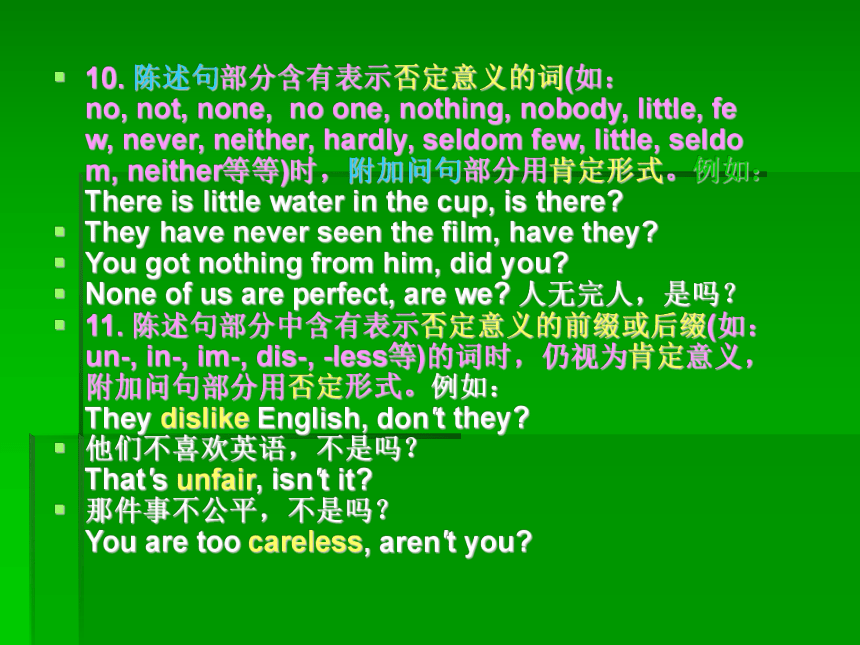
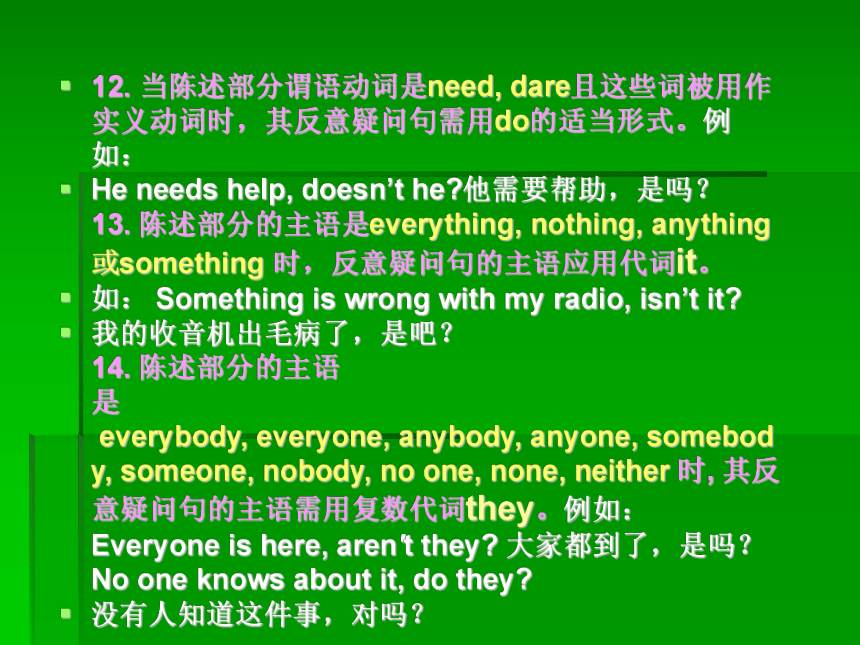
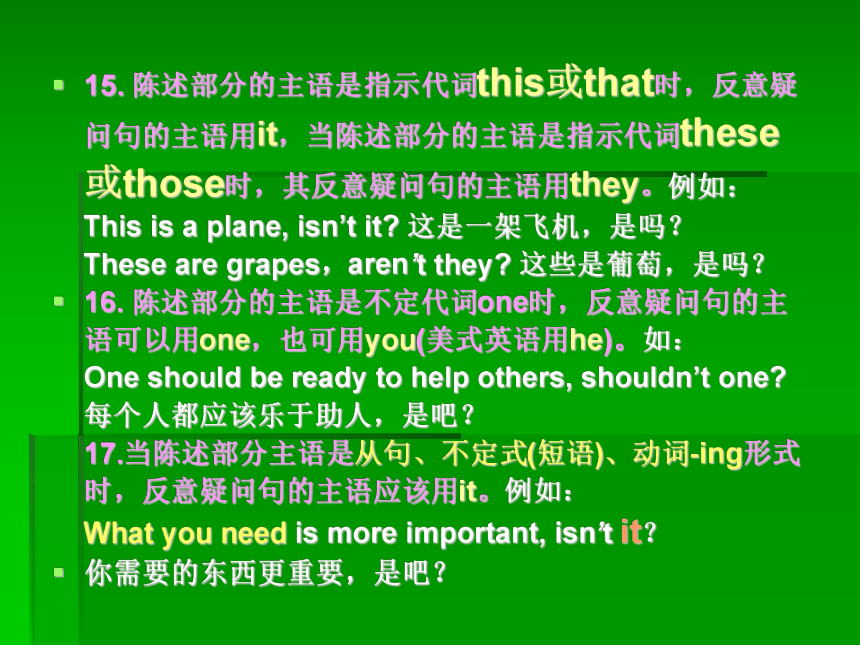

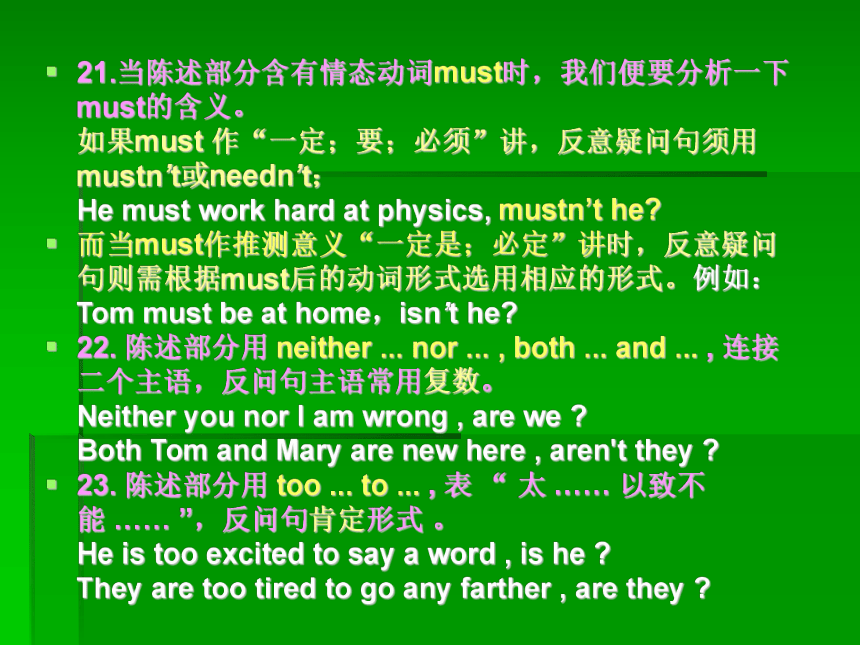
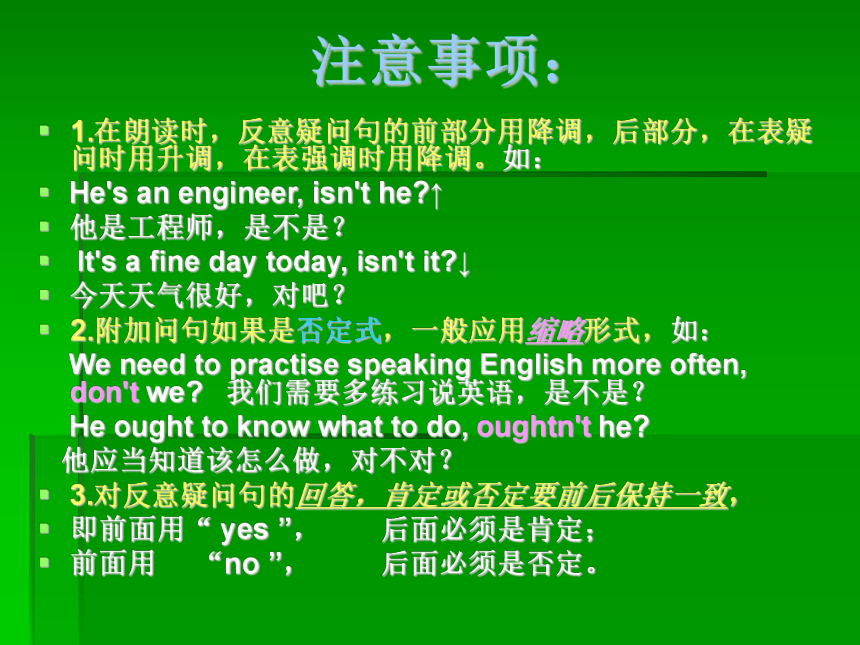
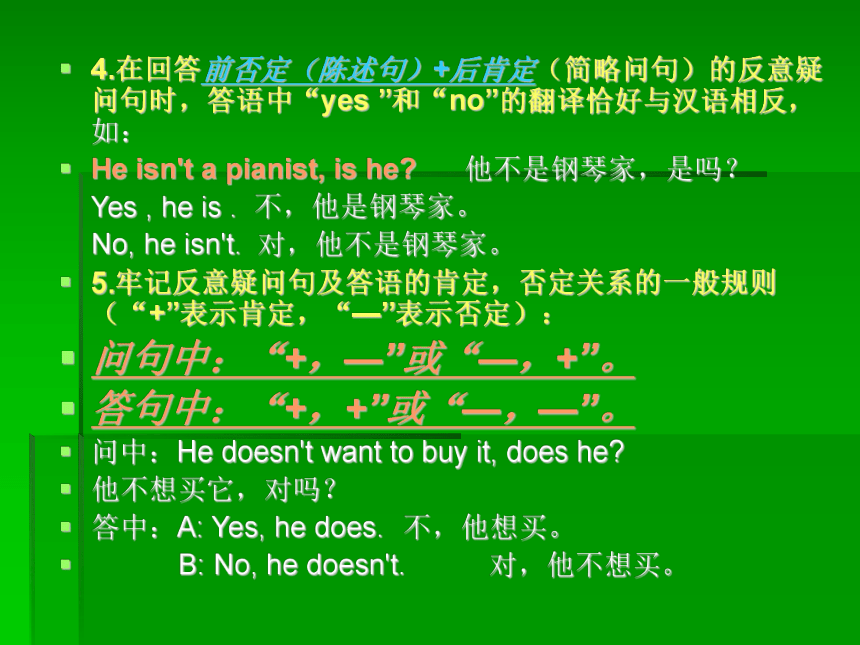
文档简介
(共33张PPT)
2013 年高考英语语法专项复习之反意疑问句
来安县半塔中学
梅 崇 兵
反意疑问句
定义:在陈述句之后附加上一个简短问句,对陈述句所叙述的事实提出相反的疑问,这种疑问句叫做反意疑问句。
结构:如陈述部分为肯定式,疑问部分用否定式。反之,如陈述部分为否定式,疑问部分用肯定式。
疑问部分重复陈述句的主语(必须用代词)和be , have,助动词或情态动词。
如陈述句中没有 be, have,助动词或情态动词,则须另加do。如:
She has gone to town, hasn‘t she?
You like it, don't you
1. 陈述句部分是"I am..."句型时,附加问句部分常用aren’t I 。例如: I am a teacher, aren’t I 我是一个老师,不是吗? 2. 陈述句部分是"There be…"句型时,附加问句部分常用be there。例如: There are some books on the desk, aren't there
3. 陈述句部分是“I wish…”句型时,附加问句部分用may I来表示征求对方的同意或许可, 前后都用肯定。例如: I wish I were you, may I 我希望我是你,可以吗? I wish her to come here, may I 我希望她到这儿来,可以吗? 4.陈述句部分是“祈使句”时,附加问句部分常用will you / won’t you。
用will you 多表示“请求”,
用won't you 多表示提醒对方注意。例如: Please come to the blackboard, will you
Do help me with my English, will you
Look at the blackboard, will you/ won't you
5. “Let’s引导的祈使句”时,附加问句部分常用shall we。
例如:Let’s go home, shall we 咱们回家吧,好吗?
6. “Let + us (me, him, her...)引导的祈使句”时,附加问句部分常用will you。例如:Let us take a rest, will you
Let him sing us a song, will you
7. 宾语从句的反意疑问句的对应规则 若反意疑问句的陈述部分为I (we) think(believe,suppose,consider)+that 从句时,问句部分的助动词和主语与that从句内的动词和主语保持一致。
I think that he has done his best, hasn’t he We think that English is very useful, isn’t it 若反意疑问句的陈述部分为I (we)don’t think(believe,suppose,consider)+that从句时,从句为否定意义,问句部分的助动词和主语仍与that从句保持一致,用肯定形式。
I don’t think that you can do it, can you We don’t believe that the news is true, is it
反意疑问句的陈述部分为非第一人称主语+think (believe,suppose,consider) + that 从句时,问句部分的助动词和主语与陈述部分(主句)的助动词和主语保持一致。
They all think that English is very useful, don’t they He didn’t think that the news is true, did he 8. .感叹句后加反意疑问句时,其反意疑问句需用be的一般现在时态的否定形式,且必须用否定形式。例如: What a good girl, isn’t she
What a fine day today, isn’t it
9. 陈述句部分是“并列句”时,附加问句部分的主语和谓语动词的形式应该与邻近的句子的主语和谓语动词的形式保持一致。例如: It is late now, but he goes on doing his homework,
doesn’t he
10. 陈述句部分含有表示否定意义的词(如:no, not, none, no one, nothing, nobody, little, few, never, neither, hardly, seldom few, little, seldom, neither等等)时,附加问句部分用肯定形式。例如: There is little water in the cup, is there
They have never seen the film, have they
You got nothing from him, did you
None of us are perfect, are we 人无完人,是吗?
11. 陈述句部分中含有表示否定意义的前缀或后缀(如:un-, in-, im-, dis-, -less等)的词时,仍视为肯定意义,附加问句部分用否定形式。例如: They dislike English, don't they
他们不喜欢英语,不是吗? That's unfair, isn't it
那件事不公平,不是吗? You are too careless, aren't you
12. 当陈述部分谓语动词是need, dare且这些词被用作实义动词时,其反意疑问句需用do的适当形式。例如:
He needs help, doesn’t he 他需要帮助,是吗? 13. 陈述部分的主语是everything, nothing, anything或something 时,反意疑问句的主语应用代词it。
如: Something is wrong with my radio, isn’t it
我的收音机出毛病了,是吧? 14. 陈述部分的主语是 everybody, everyone, anybody, anyone, somebody, someone, nobody, no one, none, neither 时, 其反意疑问句的主语需用复数代词they。例如: Everyone is here, aren't they 大家都到了,是吗? No one knows about it, do they
没有人知道这件事,对吗?
15. 陈述部分的主语是指示代词this或that时,反意疑问句的主语用it,当陈述部分的主语是指示代词these或those时,其反意疑问句的主语用they。例如: This is a plane, isn’t it 这是一架飞机,是吗? These are grapes,aren’t they 这些是葡萄,是吗?
16. 陈述部分的主语是不定代词one时,反意疑问句的主语可以用one,也可用you(美式英语用he)。如:One should be ready to help others, shouldn’t one 每个人都应该乐于助人,是吧? 17.当陈述部分主语是从句、不定式(短语)、动词-ing形式时,反意疑问句的主语应该用it。例如: What you need is more important, isn’t it?
你需要的东西更重要,是吧?
陈述部分是形式主语it 时,疑问部分的主语也用it 。
如:It took more than 100,000 men twenty years to build the Great Pyramid, didn't it
建成这座大金字塔,十万人费了二十年时间,对吗?
18.have(has)不是表示“有”的意思,并在句中做谓语时,其反意疑问句的助动词要用do, does, did。例如: They had a meeting just now,didn’t they
他们刚才开了个会,是吗? 19.陈述部分有have to 时,其反意疑问句要用助动词的否定形式。如:
You have to water the vegetables every day, don’t you 20.陈述部分有had better时,反意疑问句中要用hadn’t。如:We had better go to school at once, hadn't we
21.当陈述部分含有情态动词must时,我们便要分析一下must的含义。 如果must 作“一定;要;必须”讲,反意疑问句须用mustn’t或needn’t; He must work hard at physics, mustn’t he
而当must作推测意义“一定是;必定”讲时,反意疑问句则需根据must后的动词形式选用相应的形式。例如: Tom must be at home,isn’t he
22. 陈述部分用 neither ... nor ... , both ... and ... , 连接二个主语,反问句主语常用复数。 Neither you nor I am wrong , are we Both Tom and Mary are new here , aren't they
23. 陈述部分用 too ... to ... , 表 “ 太 …… 以致不能 …… ”,反问句肯定形式 。 He is too excited to say a word , is he They are too tired to go any farther , are they
注意事项:
1.在朗读时,反意疑问句的前部分用降调,后部分,在表疑问时用升调,在表强调时用降调。如:
He's an engineer, isn't he ↑
他是工程师,是不是?
It's a fine day today, isn't it ↓
今天天气很好,对吧?
2.附加问句如果是否定式,一般应用缩略形式,如:
We need to practise speaking English more often, don't we 我们需要多练习说英语,是不是?
He ought to know what to do, oughtn't he
他应当知道该怎么做,对不对?
3.对反意疑问句的回答,肯定或否定要前后保持一致,
即前面用“ yes ”, 后面必须是肯定;
前面用 “no ”, 后面必须是否定。
4.在回答前否定(陈述句)+后肯定(简略问句)的反意疑问句时,答语中“yes ”和“no”的翻译恰好与汉语相反,如:
He isn't a pianist, is he 他不是钢琴家,是吗?
Yes , he is . 不,他是钢琴家。
No, he isn't. 对,他不是钢琴家。
5.牢记反意疑问句及答语的肯定,否定关系的一般规则(“+”表示肯定,“—”表示否定):
问句中:“+,—”或“—,+”。
答句中:“+,+”或“—,—”。
问中:He doesn't want to buy it, does he
他不想买它,对吗?
答中:A: Yes, he does. 不,他想买。
B: No, he doesn't. 对,他不想买。
6.陈述部分如带有have to, has to, had to 时:
1)惯常行为:用do, does, did,构成 have to, has to, had to 的疑问部分。如:
We have to work from 8:00 a.m. to 5:30p.m, don't we 我们得从上午8:00工作到下午5:30,是不是?
2)特定场合:用have, has, had,构成have to, has to, had to 的疑问部分。如:
I have to work this afternoon, haven't I
我今天下午得去工作,是不是?
7.need, dare 的用法:
1)当实义动词用,疑问部分要用do 的某一形式。如:
He dared to ask the teacher many questions, didn't he 他敢向老师提许多问题,对吗?
2)当情态动词用,只重复它。如:
You needn't do that when your son is here, need you
你儿子在这里时,你不必做那事,是不是?
8.祈使句的附加句
(一)如祈使句是肯定式,
表示“请求”,疑问部分要用will you ;
若表示“劝导”“邀请”时,疑问部分要用won't you ;
也可用 can’t you ,含有 “责备或不耐烦”之意。
Shut up, can't you 闭嘴,行不行?
Come here at once, will you 立刻到这里来,好吗?
Stop talking, won’t you 别说话,好吗?
(二)如祈使句是否定式,疑问部分只能用 “will you ”。如:Don't look out of the window, will you
(三)以Let me 的祈使句,疑问部分可用 “will you ”或“may I ”如:
Let me have another try, will you
Let me do the job, may I
(四)以Let us (不包括对方在内)的祈使句,疑问部分用“will you ” 如:Let us go shopping, will you
(五)以 Let‘s (包括对方在内)的祈使句,其疑问部分用“shall we ”。
Let's go out for a drive, shall we
9. 复合句的附加句
A.当陈述句是主从复合句时:
(一)从句是that 引起的宾语从句( that 常省略),附加疑问应对陈述部分的主句提出。如:
He said nothing except that he was all right, didn’t he
(二)当陈述部分主句的主、谓是 I (We) think (believe, imagine, expect, feel 等)加 that 引导的宾语从句时,疑问部分的主语(代词)和动词要与从句的一致。如:
I think there is something wrong with the washer, isn't there
We don’t suppose he cares, does he
注:think, believe, imagine 等表示揣测,信念,愿望之类心理活动的动词+that 宾语从句时,务必注意这些动词具有否定转移的现象。)
(三)当陈述部分是It (This, That或其他表示时间的名词+ be + the + first time (month 等)+that 从句(that 可省)时,疑问部分与主句的主语和谓语保持一致 .
This is the third time he has left home, isn't it Tomorrow will be the second time that I have had to have my TV set repaired again, won't it
B.复杂情况:
(一)当陈述部分的主语是从句、不定式(短语)、动名词等时,疑问部分的主语一律用it 。如:
Whether they will come or not doesn’t matter too much, does it (主语从句作陈述句的主语)
Packing the suitcase has taken up a whole morning, hasn't it (动名词短语作陈述句的主语)
To learn a foreign language well in such a short time isn't easy, is it (不定式短语作陈述句的主语)
(二)若陈述句为并列句时,疑问部分的主语通常与临近分句的主谓一致。如:
We must redouble our efforts, or we'll not be able to catch up with the others, will we
我们必须加倍努力,否则我们就赶不上别人,对吗?
(三)如陈述部分含情态动词must时:
(1)表示“应该”,其疑问部分用mustn't(不应该),如:You must work hard next term, mustn't you 下学期你应该努力学习,对吗?
(2)表示“必须”,其疑问部分用needn't(不必),如:
We must go at once, needn‘t we
我们必须立刻走,是吗?
(3)表示推测,其疑问部分必须与must 后面的主要动词相呼应。如:
1)对现在动作或存在的情况的推测:
You must know the answer to the exercise, don't you
你一定知道这项练习的答案,是不是?
That must be your bed, isn't it
那一定是你的床,是吗?
2)对过去发生的动作或存在的情况的推测:
①表示肯定
You must have left your bag in the theatre, haven’t you 你一定是把包落在剧场了,是不是?
Aunt Liu must have got to the U.S.A. yesterday, didn't she 刘大婶昨天准是到了美国了,对不?
②表示否定表示推测时,否定式通常不是must not ,而是can’t (cannot). 如:
He can't have been to your home; he doesn't know your address, does he
他不可能去过你家;他不知道你的地址,是不是?
(4)陈述部分含情态动词mustn’t,表示禁止时,疑问部分就可以用must或may,如:
We mustn’t be late, must / may we
我们不可以迟到,是吗?
10.英英与美英的反意疑问句的差异
(一)如陈述句have 作“有”解时, 疑问部分在美国英语中用 do的某一形式;在英国英语中用have 的适当形式,如:
She has money with her, doesn’t she (美英)
He hasn’t any friends in London, has he (英英)
(二)陈述部分用不定代词one 作主语时,疑问部分在美国英语中用 he ,在英国英语中仍用one,如:
One should love his country, shouldn’t he (美英)
任何人都应该爱国,对吧?
(三)陈述部分带有情态动词ought to 时,附加疑问部分在美国英语中用should ;在英国英语中仍用 ought,
如:The boy ought to be praised, shouldn't he (美英) We ought to read the book, oughtn't we (英英)
Do some exercises!
1.I’m a student who have my own dreams,
aren’t I
2.I don’t think I’m a very industrious student,
am I
3.He made no answer when asked by the teacher,
did he
4.We have to finish the paper in two hours,
don’t we
5.They used to dinner downtown,
didn’t they/ usedn’t they
6.I must finish the work in such a short time,
mustn’t I
7.He must have finished his homework yesterday,
didn’t he
8. What a smell,
isn’t it
9.Nothing has been left ,
has it
10. Nobody knows about it,
do they / does he
Do some exercises!
11.Don’t mention it again,
will you
12.Let’s see what the teacher says about this,
shall we
13.Let me have a try,
will you
14.He is not unkind to his classmates,
is he
15. He has done very well in the last two years,and he is sure to
pass the entrance exams for college,
isn’t he
16. We need not do it again,
He doesn't dare to go home alone,
17. Don't do that again,
Let's go and listen to the music,
Let us wait for you in the reading-room,
18.There will not be any trouble,
19. It is impossible,
20. He must be there now,
need we
does he
will you
shall we
will you
will there
isn’t it
isn’t he
回答根据前部分的问句来作答,无论情况怎样,肯定时作yes回答,否定则用no, 且前后要一致。
B
21. --- You haven’t been here long, have you
--- ______. I am new here.
A. Yes, I have B. No, I haven’t
C. Yes, I haven’t D. No, I have
It is the third time that 从句…对主句进行反问.
C
22. It’s the third time that Peter has made such a mistake, _______
A. hasn’t he B. isn’t he C. isn’t it D. hasn’t it
陈述部分用不定代词one做主语,疑问部分的主语在正式场合用one,非正式场合用you
C
23. One can’t be too careful, ______
A. can they B. can’t he C. can one D. can’t one
否定祈使句疑问部分用will提问
B
24. Don’t forget to post the letter for me , ____
A. don’t you B. will you C. do you D. won’t you
Let us不包括我在内,let’s包括我在内
Let’s….., shall we Let us…, will you
C
25. Let us go swimming this weekend, ______
A. shan’t we B. shall we C. will you D. won’t you
前部分的谓语是there be,反意问句部分也用there be形式
C
26. There will be rain tomorrow, ______
A. isn’t there B. isn’t it C. won’t there D. won’t it
Let us不包括我在内,let’s包括我在内
Let’s….., shall we Let us…, will you
27. It’s a fine day. Let’s go fishing, _______
A. won’t you B. will you C. don’t we D. shall we
D
must do 表示对现在事情的猜测= The man in blue is your brother, isn’t he
C
28. The man in blue must be your brother, _______
A. mustn’t he B. needn’t he C. isn’t he D. is he
陈述部分如果是I don’t think/suppose/believe/expect…+宾语从句时,疑问部分中的动词和主语应和宾语从句中的动词和主语保持一致,并且要用肯定形式.
对从句提问.2. 否定还原
= He will not come to our party, will he
A
29. I don’t think he will come to our party, _______
A. will he B. won’t he C. does he D. do I
前句的谓语动词为used to时,其疑问部分的谓语动词可采用两种形式,例如
There used to be a cinema here before the war,
usedn’t there /didn’t there
A
30. There used to be a church behind the hospital, ______
A. didn’t there B. wasn’t there C. didn’t it D. wasn’t it
陈述部分的谓语动词是表示愿望的wish等时,疑问部分的谓语动词用may,而前后两个部分均用肯定式,例如
I wish to go home now ,may I?
C
31. I wish to call on your sister on my way home, ______
A. do I B. don’t I C. may I D. will I
“ that they failed their driving test”为the news的同位语从句,谓语动词为过去式,故疑问部分用didn’t it
D
32. The news that they failed their driving test discouraged him, ______
A. did they B. didn’t they C. did it D. didn’t it
C
33. Everyone must have known the death of the waitress, _____
A. must they B. mustn’t they
C. haven’t they D. have they
must have+过去分词时,若前句强调对过去情况的猜测(一般有过去时间状语),疑问部分的谓语动词用didn’t+主语;
若前句强调动作的完成,疑问部分的谓语动词用haven’t(hasn’t)
You must have seen the film,haven’t you?
He must have met her yesterday,didn’t he?
must have done 对过去事情的猜测,yesterday表示过去,强调电话的丢失,故用didn’t he
B
34. He must have left his cellphone in the office yesterday, ______
A. did he B. didn’t he C. hasn’t he D. has he
I don’t think/suppose/believe/expect…+宾语从句时,疑问部分中的动词和主语应和宾语从句中的动词和主语保持一致,并且要用肯定形式.1.对从句提问.2. 否定还原Anyone won’t volunteer, will they
A
35. I don’t suppose anyone will volunteer, ____
A. will they B. do I C. don’t I D. won’t they
前部分的谓语是be, have, had better或情态动词,反意部分仍用这些动词. 也就是前后一致.
D
36. We had better do it by ourselves, ______
A. didn’t we B. did we C. had we D. hadn’t we
陈述部分如含有宾语从句,附加疑问部分的主语和谓语通常要与主句的主语和谓语保持一致
B
37. Mr. Wang said that he was not there then, ______
A. did he B. didn’t he C. was he D. wasn’t he
陈述部分的谓语动词是表示愿望的wish等时,疑问部分的谓语动词用may,而前后两个部分均用肯定式
D
38. I wish to remain here tonight, _____
A. do I B. will I C. shall I D. may I
前半句为从句,后半句为主句,用if连接。在主从句中,反意疑问部分跟主句保持一致
C
39. If I knew the answer I wouldn’t be asking, _____
A. didn’t I B. did I C. would I D. wouldn’t I
如果陈述部分包含有no,never,hardly,seldom,few,little,nowhere,nothing等否定或半否定词,疑问部分用肯定形式
A
40. Nothing seems to please her, ______
A. does it B. doesn’t it C. is it D. isn’t it
当陈述部分有dare或need时,若dare和need为实义动词,疑问部分的谓语用do的适当形式,若dare和need为情态动词时,疑问部分用dare或need构成
A
41. You daren’t say that to him, _____
A. dare you B. do you C. daren’t you D. don’t you
for….late为对前句的补充原因,for为并列连词,引导并列句。所以疑问部分对the third time提问,前面用肯定,问句用否定形式
B
42. Mike isn’t a hard working student, for this is the third time that he has been late, ____
A. has he B. isn’t it C. hasn’t he D. isn’t he
B
43. It was for this reason that her uncle moved out of New York and settled down in a small town, ______
didn’t he B. wasn’t it C. was it D. did he
祈使句,反意疑问部分用will肯定的祈使句疑问部分可用肯定或否定,一般用肯定,如前句部分为否定的祈使句,疑问部分则必用肯定形式
A
44. Lucy, do be open-minded and confident, ________
A. will you B. aren’t you C. won’t you D. are you
强调句,,对主句进行提问.
D
45. It was in the street that I saw her, _________
A. was it B. didn’t I C. did I D. wasn’t it
2013 年高考英语语法专项复习之反意疑问句
来安县半塔中学
梅 崇 兵
反意疑问句
定义:在陈述句之后附加上一个简短问句,对陈述句所叙述的事实提出相反的疑问,这种疑问句叫做反意疑问句。
结构:如陈述部分为肯定式,疑问部分用否定式。反之,如陈述部分为否定式,疑问部分用肯定式。
疑问部分重复陈述句的主语(必须用代词)和be , have,助动词或情态动词。
如陈述句中没有 be, have,助动词或情态动词,则须另加do。如:
She has gone to town, hasn‘t she?
You like it, don't you
1. 陈述句部分是"I am..."句型时,附加问句部分常用aren’t I 。例如: I am a teacher, aren’t I 我是一个老师,不是吗? 2. 陈述句部分是"There be…"句型时,附加问句部分常用be there。例如: There are some books on the desk, aren't there
3. 陈述句部分是“I wish…”句型时,附加问句部分用may I来表示征求对方的同意或许可, 前后都用肯定。例如: I wish I were you, may I 我希望我是你,可以吗? I wish her to come here, may I 我希望她到这儿来,可以吗? 4.陈述句部分是“祈使句”时,附加问句部分常用will you / won’t you。
用will you 多表示“请求”,
用won't you 多表示提醒对方注意。例如: Please come to the blackboard, will you
Do help me with my English, will you
Look at the blackboard, will you/ won't you
5. “Let’s引导的祈使句”时,附加问句部分常用shall we。
例如:Let’s go home, shall we 咱们回家吧,好吗?
6. “Let + us (me, him, her...)引导的祈使句”时,附加问句部分常用will you。例如:Let us take a rest, will you
Let him sing us a song, will you
7. 宾语从句的反意疑问句的对应规则 若反意疑问句的陈述部分为I (we) think(believe,suppose,consider)+that 从句时,问句部分的助动词和主语与that从句内的动词和主语保持一致。
I think that he has done his best, hasn’t he We think that English is very useful, isn’t it 若反意疑问句的陈述部分为I (we)don’t think(believe,suppose,consider)+that从句时,从句为否定意义,问句部分的助动词和主语仍与that从句保持一致,用肯定形式。
I don’t think that you can do it, can you We don’t believe that the news is true, is it
反意疑问句的陈述部分为非第一人称主语+think (believe,suppose,consider) + that 从句时,问句部分的助动词和主语与陈述部分(主句)的助动词和主语保持一致。
They all think that English is very useful, don’t they He didn’t think that the news is true, did he 8. .感叹句后加反意疑问句时,其反意疑问句需用be的一般现在时态的否定形式,且必须用否定形式。例如: What a good girl, isn’t she
What a fine day today, isn’t it
9. 陈述句部分是“并列句”时,附加问句部分的主语和谓语动词的形式应该与邻近的句子的主语和谓语动词的形式保持一致。例如: It is late now, but he goes on doing his homework,
doesn’t he
10. 陈述句部分含有表示否定意义的词(如:no, not, none, no one, nothing, nobody, little, few, never, neither, hardly, seldom few, little, seldom, neither等等)时,附加问句部分用肯定形式。例如: There is little water in the cup, is there
They have never seen the film, have they
You got nothing from him, did you
None of us are perfect, are we 人无完人,是吗?
11. 陈述句部分中含有表示否定意义的前缀或后缀(如:un-, in-, im-, dis-, -less等)的词时,仍视为肯定意义,附加问句部分用否定形式。例如: They dislike English, don't they
他们不喜欢英语,不是吗? That's unfair, isn't it
那件事不公平,不是吗? You are too careless, aren't you
12. 当陈述部分谓语动词是need, dare且这些词被用作实义动词时,其反意疑问句需用do的适当形式。例如:
He needs help, doesn’t he 他需要帮助,是吗? 13. 陈述部分的主语是everything, nothing, anything或something 时,反意疑问句的主语应用代词it。
如: Something is wrong with my radio, isn’t it
我的收音机出毛病了,是吧? 14. 陈述部分的主语是 everybody, everyone, anybody, anyone, somebody, someone, nobody, no one, none, neither 时, 其反意疑问句的主语需用复数代词they。例如: Everyone is here, aren't they 大家都到了,是吗? No one knows about it, do they
没有人知道这件事,对吗?
15. 陈述部分的主语是指示代词this或that时,反意疑问句的主语用it,当陈述部分的主语是指示代词these或those时,其反意疑问句的主语用they。例如: This is a plane, isn’t it 这是一架飞机,是吗? These are grapes,aren’t they 这些是葡萄,是吗?
16. 陈述部分的主语是不定代词one时,反意疑问句的主语可以用one,也可用you(美式英语用he)。如:One should be ready to help others, shouldn’t one 每个人都应该乐于助人,是吧? 17.当陈述部分主语是从句、不定式(短语)、动词-ing形式时,反意疑问句的主语应该用it。例如: What you need is more important, isn’t it?
你需要的东西更重要,是吧?
陈述部分是形式主语it 时,疑问部分的主语也用it 。
如:It took more than 100,000 men twenty years to build the Great Pyramid, didn't it
建成这座大金字塔,十万人费了二十年时间,对吗?
18.have(has)不是表示“有”的意思,并在句中做谓语时,其反意疑问句的助动词要用do, does, did。例如: They had a meeting just now,didn’t they
他们刚才开了个会,是吗? 19.陈述部分有have to 时,其反意疑问句要用助动词的否定形式。如:
You have to water the vegetables every day, don’t you 20.陈述部分有had better时,反意疑问句中要用hadn’t。如:We had better go to school at once, hadn't we
21.当陈述部分含有情态动词must时,我们便要分析一下must的含义。 如果must 作“一定;要;必须”讲,反意疑问句须用mustn’t或needn’t; He must work hard at physics, mustn’t he
而当must作推测意义“一定是;必定”讲时,反意疑问句则需根据must后的动词形式选用相应的形式。例如: Tom must be at home,isn’t he
22. 陈述部分用 neither ... nor ... , both ... and ... , 连接二个主语,反问句主语常用复数。 Neither you nor I am wrong , are we Both Tom and Mary are new here , aren't they
23. 陈述部分用 too ... to ... , 表 “ 太 …… 以致不能 …… ”,反问句肯定形式 。 He is too excited to say a word , is he They are too tired to go any farther , are they
注意事项:
1.在朗读时,反意疑问句的前部分用降调,后部分,在表疑问时用升调,在表强调时用降调。如:
He's an engineer, isn't he ↑
他是工程师,是不是?
It's a fine day today, isn't it ↓
今天天气很好,对吧?
2.附加问句如果是否定式,一般应用缩略形式,如:
We need to practise speaking English more often, don't we 我们需要多练习说英语,是不是?
He ought to know what to do, oughtn't he
他应当知道该怎么做,对不对?
3.对反意疑问句的回答,肯定或否定要前后保持一致,
即前面用“ yes ”, 后面必须是肯定;
前面用 “no ”, 后面必须是否定。
4.在回答前否定(陈述句)+后肯定(简略问句)的反意疑问句时,答语中“yes ”和“no”的翻译恰好与汉语相反,如:
He isn't a pianist, is he 他不是钢琴家,是吗?
Yes , he is . 不,他是钢琴家。
No, he isn't. 对,他不是钢琴家。
5.牢记反意疑问句及答语的肯定,否定关系的一般规则(“+”表示肯定,“—”表示否定):
问句中:“+,—”或“—,+”。
答句中:“+,+”或“—,—”。
问中:He doesn't want to buy it, does he
他不想买它,对吗?
答中:A: Yes, he does. 不,他想买。
B: No, he doesn't. 对,他不想买。
6.陈述部分如带有have to, has to, had to 时:
1)惯常行为:用do, does, did,构成 have to, has to, had to 的疑问部分。如:
We have to work from 8:00 a.m. to 5:30p.m, don't we 我们得从上午8:00工作到下午5:30,是不是?
2)特定场合:用have, has, had,构成have to, has to, had to 的疑问部分。如:
I have to work this afternoon, haven't I
我今天下午得去工作,是不是?
7.need, dare 的用法:
1)当实义动词用,疑问部分要用do 的某一形式。如:
He dared to ask the teacher many questions, didn't he 他敢向老师提许多问题,对吗?
2)当情态动词用,只重复它。如:
You needn't do that when your son is here, need you
你儿子在这里时,你不必做那事,是不是?
8.祈使句的附加句
(一)如祈使句是肯定式,
表示“请求”,疑问部分要用will you ;
若表示“劝导”“邀请”时,疑问部分要用won't you ;
也可用 can’t you ,含有 “责备或不耐烦”之意。
Shut up, can't you 闭嘴,行不行?
Come here at once, will you 立刻到这里来,好吗?
Stop talking, won’t you 别说话,好吗?
(二)如祈使句是否定式,疑问部分只能用 “will you ”。如:Don't look out of the window, will you
(三)以Let me 的祈使句,疑问部分可用 “will you ”或“may I ”如:
Let me have another try, will you
Let me do the job, may I
(四)以Let us (不包括对方在内)的祈使句,疑问部分用“will you ” 如:Let us go shopping, will you
(五)以 Let‘s (包括对方在内)的祈使句,其疑问部分用“shall we ”。
Let's go out for a drive, shall we
9. 复合句的附加句
A.当陈述句是主从复合句时:
(一)从句是that 引起的宾语从句( that 常省略),附加疑问应对陈述部分的主句提出。如:
He said nothing except that he was all right, didn’t he
(二)当陈述部分主句的主、谓是 I (We) think (believe, imagine, expect, feel 等)加 that 引导的宾语从句时,疑问部分的主语(代词)和动词要与从句的一致。如:
I think there is something wrong with the washer, isn't there
We don’t suppose he cares, does he
注:think, believe, imagine 等表示揣测,信念,愿望之类心理活动的动词+that 宾语从句时,务必注意这些动词具有否定转移的现象。)
(三)当陈述部分是It (This, That或其他表示时间的名词+ be + the + first time (month 等)+that 从句(that 可省)时,疑问部分与主句的主语和谓语保持一致 .
This is the third time he has left home, isn't it Tomorrow will be the second time that I have had to have my TV set repaired again, won't it
B.复杂情况:
(一)当陈述部分的主语是从句、不定式(短语)、动名词等时,疑问部分的主语一律用it 。如:
Whether they will come or not doesn’t matter too much, does it (主语从句作陈述句的主语)
Packing the suitcase has taken up a whole morning, hasn't it (动名词短语作陈述句的主语)
To learn a foreign language well in such a short time isn't easy, is it (不定式短语作陈述句的主语)
(二)若陈述句为并列句时,疑问部分的主语通常与临近分句的主谓一致。如:
We must redouble our efforts, or we'll not be able to catch up with the others, will we
我们必须加倍努力,否则我们就赶不上别人,对吗?
(三)如陈述部分含情态动词must时:
(1)表示“应该”,其疑问部分用mustn't(不应该),如:You must work hard next term, mustn't you 下学期你应该努力学习,对吗?
(2)表示“必须”,其疑问部分用needn't(不必),如:
We must go at once, needn‘t we
我们必须立刻走,是吗?
(3)表示推测,其疑问部分必须与must 后面的主要动词相呼应。如:
1)对现在动作或存在的情况的推测:
You must know the answer to the exercise, don't you
你一定知道这项练习的答案,是不是?
That must be your bed, isn't it
那一定是你的床,是吗?
2)对过去发生的动作或存在的情况的推测:
①表示肯定
You must have left your bag in the theatre, haven’t you 你一定是把包落在剧场了,是不是?
Aunt Liu must have got to the U.S.A. yesterday, didn't she 刘大婶昨天准是到了美国了,对不?
②表示否定表示推测时,否定式通常不是must not ,而是can’t (cannot). 如:
He can't have been to your home; he doesn't know your address, does he
他不可能去过你家;他不知道你的地址,是不是?
(4)陈述部分含情态动词mustn’t,表示禁止时,疑问部分就可以用must或may,如:
We mustn’t be late, must / may we
我们不可以迟到,是吗?
10.英英与美英的反意疑问句的差异
(一)如陈述句have 作“有”解时, 疑问部分在美国英语中用 do的某一形式;在英国英语中用have 的适当形式,如:
She has money with her, doesn’t she (美英)
He hasn’t any friends in London, has he (英英)
(二)陈述部分用不定代词one 作主语时,疑问部分在美国英语中用 he ,在英国英语中仍用one,如:
One should love his country, shouldn’t he (美英)
任何人都应该爱国,对吧?
(三)陈述部分带有情态动词ought to 时,附加疑问部分在美国英语中用should ;在英国英语中仍用 ought,
如:The boy ought to be praised, shouldn't he (美英) We ought to read the book, oughtn't we (英英)
Do some exercises!
1.I’m a student who have my own dreams,
aren’t I
2.I don’t think I’m a very industrious student,
am I
3.He made no answer when asked by the teacher,
did he
4.We have to finish the paper in two hours,
don’t we
5.They used to dinner downtown,
didn’t they/ usedn’t they
6.I must finish the work in such a short time,
mustn’t I
7.He must have finished his homework yesterday,
didn’t he
8. What a smell,
isn’t it
9.Nothing has been left ,
has it
10. Nobody knows about it,
do they / does he
Do some exercises!
11.Don’t mention it again,
will you
12.Let’s see what the teacher says about this,
shall we
13.Let me have a try,
will you
14.He is not unkind to his classmates,
is he
15. He has done very well in the last two years,and he is sure to
pass the entrance exams for college,
isn’t he
16. We need not do it again,
He doesn't dare to go home alone,
17. Don't do that again,
Let's go and listen to the music,
Let us wait for you in the reading-room,
18.There will not be any trouble,
19. It is impossible,
20. He must be there now,
need we
does he
will you
shall we
will you
will there
isn’t it
isn’t he
回答根据前部分的问句来作答,无论情况怎样,肯定时作yes回答,否定则用no, 且前后要一致。
B
21. --- You haven’t been here long, have you
--- ______. I am new here.
A. Yes, I have B. No, I haven’t
C. Yes, I haven’t D. No, I have
It is the third time that 从句…对主句进行反问.
C
22. It’s the third time that Peter has made such a mistake, _______
A. hasn’t he B. isn’t he C. isn’t it D. hasn’t it
陈述部分用不定代词one做主语,疑问部分的主语在正式场合用one,非正式场合用you
C
23. One can’t be too careful, ______
A. can they B. can’t he C. can one D. can’t one
否定祈使句疑问部分用will提问
B
24. Don’t forget to post the letter for me , ____
A. don’t you B. will you C. do you D. won’t you
Let us不包括我在内,let’s包括我在内
Let’s….., shall we Let us…, will you
C
25. Let us go swimming this weekend, ______
A. shan’t we B. shall we C. will you D. won’t you
前部分的谓语是there be,反意问句部分也用there be形式
C
26. There will be rain tomorrow, ______
A. isn’t there B. isn’t it C. won’t there D. won’t it
Let us不包括我在内,let’s包括我在内
Let’s….., shall we Let us…, will you
27. It’s a fine day. Let’s go fishing, _______
A. won’t you B. will you C. don’t we D. shall we
D
must do 表示对现在事情的猜测= The man in blue is your brother, isn’t he
C
28. The man in blue must be your brother, _______
A. mustn’t he B. needn’t he C. isn’t he D. is he
陈述部分如果是I don’t think/suppose/believe/expect…+宾语从句时,疑问部分中的动词和主语应和宾语从句中的动词和主语保持一致,并且要用肯定形式.
对从句提问.2. 否定还原
= He will not come to our party, will he
A
29. I don’t think he will come to our party, _______
A. will he B. won’t he C. does he D. do I
前句的谓语动词为used to时,其疑问部分的谓语动词可采用两种形式,例如
There used to be a cinema here before the war,
usedn’t there /didn’t there
A
30. There used to be a church behind the hospital, ______
A. didn’t there B. wasn’t there C. didn’t it D. wasn’t it
陈述部分的谓语动词是表示愿望的wish等时,疑问部分的谓语动词用may,而前后两个部分均用肯定式,例如
I wish to go home now ,may I?
C
31. I wish to call on your sister on my way home, ______
A. do I B. don’t I C. may I D. will I
“ that they failed their driving test”为the news的同位语从句,谓语动词为过去式,故疑问部分用didn’t it
D
32. The news that they failed their driving test discouraged him, ______
A. did they B. didn’t they C. did it D. didn’t it
C
33. Everyone must have known the death of the waitress, _____
A. must they B. mustn’t they
C. haven’t they D. have they
must have+过去分词时,若前句强调对过去情况的猜测(一般有过去时间状语),疑问部分的谓语动词用didn’t+主语;
若前句强调动作的完成,疑问部分的谓语动词用haven’t(hasn’t)
You must have seen the film,haven’t you?
He must have met her yesterday,didn’t he?
must have done 对过去事情的猜测,yesterday表示过去,强调电话的丢失,故用didn’t he
B
34. He must have left his cellphone in the office yesterday, ______
A. did he B. didn’t he C. hasn’t he D. has he
I don’t think/suppose/believe/expect…+宾语从句时,疑问部分中的动词和主语应和宾语从句中的动词和主语保持一致,并且要用肯定形式.1.对从句提问.2. 否定还原Anyone won’t volunteer, will they
A
35. I don’t suppose anyone will volunteer, ____
A. will they B. do I C. don’t I D. won’t they
前部分的谓语是be, have, had better或情态动词,反意部分仍用这些动词. 也就是前后一致.
D
36. We had better do it by ourselves, ______
A. didn’t we B. did we C. had we D. hadn’t we
陈述部分如含有宾语从句,附加疑问部分的主语和谓语通常要与主句的主语和谓语保持一致
B
37. Mr. Wang said that he was not there then, ______
A. did he B. didn’t he C. was he D. wasn’t he
陈述部分的谓语动词是表示愿望的wish等时,疑问部分的谓语动词用may,而前后两个部分均用肯定式
D
38. I wish to remain here tonight, _____
A. do I B. will I C. shall I D. may I
前半句为从句,后半句为主句,用if连接。在主从句中,反意疑问部分跟主句保持一致
C
39. If I knew the answer I wouldn’t be asking, _____
A. didn’t I B. did I C. would I D. wouldn’t I
如果陈述部分包含有no,never,hardly,seldom,few,little,nowhere,nothing等否定或半否定词,疑问部分用肯定形式
A
40. Nothing seems to please her, ______
A. does it B. doesn’t it C. is it D. isn’t it
当陈述部分有dare或need时,若dare和need为实义动词,疑问部分的谓语用do的适当形式,若dare和need为情态动词时,疑问部分用dare或need构成
A
41. You daren’t say that to him, _____
A. dare you B. do you C. daren’t you D. don’t you
for….late为对前句的补充原因,for为并列连词,引导并列句。所以疑问部分对the third time提问,前面用肯定,问句用否定形式
B
42. Mike isn’t a hard working student, for this is the third time that he has been late, ____
A. has he B. isn’t it C. hasn’t he D. isn’t he
B
43. It was for this reason that her uncle moved out of New York and settled down in a small town, ______
didn’t he B. wasn’t it C. was it D. did he
祈使句,反意疑问部分用will肯定的祈使句疑问部分可用肯定或否定,一般用肯定,如前句部分为否定的祈使句,疑问部分则必用肯定形式
A
44. Lucy, do be open-minded and confident, ________
A. will you B. aren’t you C. won’t you D. are you
强调句,,对主句进行提问.
D
45. It was in the street that I saw her, _________
A. was it B. didn’t I C. did I D. wasn’t it
